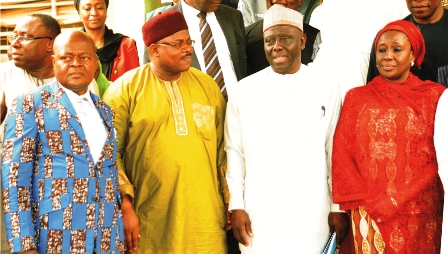Business
‘Constitute Team Of Experts On Economic Recovery’

The Pillar of
Associations, umbrella body of all registered trade unions/associations, Rivers State, has advised the Federal Government to constitute a team of experts to brainstorm and come out with a lasting solution to the nation’s economic challenges.
President of the association, Comrade Emeka Onyekwum who gave the advice in an interview with The Tide in Port Harcourt Wednesday, said that the composition of team of economic experts to re-examine the economic policies of the country would produce positive result if properly implemented.
According to Onyekwum, since our old policies are outdated, it is necessary to formulate new ones that would meet global standards, pointing out that diversification of the economy from oil to large-scale agriculture was inevitable.
He stressed the need to provide enabling environment for farmers through soft loans, noting that the present economic melt-down has reached a crescendo that requires all hands on deck to find solution to it and prayed for President Muhammadu Buhari’s quick recovery from his illness to enable him attend to the myriad of problems of the country.
On the plan, by Rivers State House of Assembly to introduce more taxes, Onyekwum said such move would amount to imposition of multiple taxes on the business community and that it conflicts with the Federal Internal Revenue Service’s Value Added Tax (FIRSVAT).
He opined that the state government would generate sufficient revenue if it embarks on developing tourist attractions in parts of the state, pointing out that imposing more tax would further aggravate the economic hardship on the business people who hardly sell their goods due to scarcity of funds.
Advising the RSHA to enact a law that would promote tourism in the state, the Pillar of Associations boss noted that development of tourist centres in Port Harcourt would restore the garden city status of the state capital, as well as extend such projects to Isaka and other areas.
He said that taxing goods and services consumed in the hospitality business would be an additional hardship on the consumers who would be made to pay higher and enjoined the state lawmakers to come out with laws that have human face.
Shedie Okpara
Transport
Automated Points Concession : FAAN Workers Gave 72hrs To Revise Decisions In PH

Transport
FAAN Announces Pick-Up Points for Go-Cashless Cards

Business
Fidelity Bank To Empower Women With Sustainable Entrepreneurship Skills, HAP2.0
-
Politics3 days ago
2027: NIGERIANS FAULT INEC ON DIGITAL MEMBERSHIP REGISTER DIRECTIVE
-

 Environment3 days ago
Environment3 days agoLAWMA Director Says Sweeping Reforms Have Improved Waste Collection
-
Politics3 days ago
LP Crisis: Ex-NWC Member Dumps Dumps Abure Faction
-

 Politics3 days ago
Politics3 days agoUmahi Dismisses Allegations On Social Media, Insists On Projects Delivery
-

 Sports3 days ago
Sports3 days agoAbia Not Sure To Secure continental Ticket
-
Sports3 days ago
La Liga: Yamal Records First Career Hat-trick
-

 Sports3 days ago
Sports3 days agoCity Survive Leeds’ Challenge At Elland Road
-
Politics3 days ago
NATASHA ELECTRIC VEHICLES INITIATIVE IN KOGI CENTRAL

